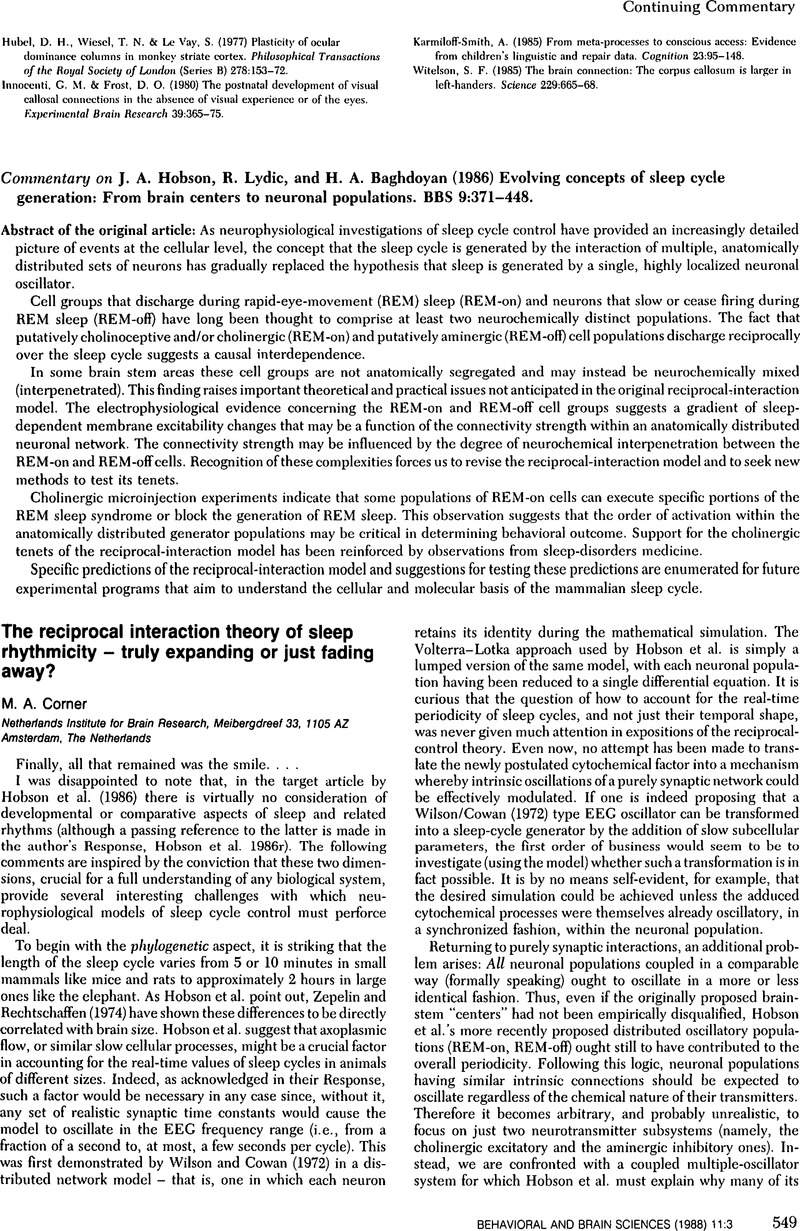No CrossRef data available.
Article contents
The reciprocal interaction theory of sleep rhythmicity – truly expanding or just fading away?
Published online by Cambridge University Press: 04 February 2010
Abstract
An abstract is not available for this content so a preview has been provided. Please use the Get access link above for information on how to access this content.

- Type
- Continuing Commentary
- Information
- Copyright
- Copyright © Cambridge University Press 1988
References
Amatruda, T., Black, D., McKenna, T., McCarley, R. W. & Hobson, J. A. (1975) Sleep cycle control and cholinergic mechanisms: Differential effects of carbachol injections at pontine brain stem sites. Brain Research 98:501–15.CrossRefGoogle ScholarPubMed
Corner, M. A. (1977) Sleep and the beginnings of behavior in the animal kingdom – studies of ultradian motility cycles in early life. Progress in Neurobiology 80:279–95.CrossRefGoogle Scholar
Goodwin, B. C. (1963) The relaxation time of the epigenetic process. In: Temporal organization in cells. Academic Press.Google Scholar
Grossman, S. P. (1960) Eating or drinking elicited by direct adrenergic or cholinergic stimulation of hypothalamus. Science 132:301–2.CrossRefGoogle ScholarPubMed
Grossman, S. P. (1962) Effects of adrenergic and cholinergic blocking agents on hypothalamic mechanisms. American Journal of Physiology 202:1230–36.CrossRefGoogle Scholar
Grossman, S. P. (1967) Neuropharmacology of central mechanisms contributing to control of food and water intake. In: Handbook of physiology. Sec. 6: Alimentary canal. Vol. 1: Food and water intake, ed. Code, C. F.. American Physiological Society.Google Scholar
Hernández-Peón, R., Chavez-Ibarra, G., Morgane, P. J. & Timo-Iaria, C. (1962) Cholinergic pathways for sleep, alertness and rage in the limbic midbrain circuit. Acta Neurologica Latinoamericana 8:93–96.Google Scholar
Hernández-Peón, R., Chavez-Ibarra, G., Morgane, P. J. & Timo-Iaria, C. (1963) Limbic cholinergic pathways involved in sleep and emotional behavior. Experimental Neurology 8:93–111.CrossRefGoogle Scholar
Hobson, J. A., Lydic, R. & Baghdoyan, H. A. (1986) Evolving concepts of sleep cycle generation: From brain centers to neuronal populations. Behavioral and Brain Sciences 9:371–448.CrossRefGoogle Scholar
Hobson, J. A., Lydic, R. & Baghdoyan, H. A. (1986r) When is a reflex not a reflex? The riddle of behavioral-state control. Behavioral and Brain Sciences 9:426–38.CrossRefGoogle Scholar
MacLean, P. D. (1957) Chemical and electrical stimulation of hippocampus in unrestrained animals. Archives of Neurology & Psychiatry 78:113–27.CrossRefGoogle ScholarPubMed
Morgane, P. J. (1986) When is a “center” not a “center”? When it's “anatomically distributed”: Prospects for a “diffuse REM center” (“generator”). Behavioral and Brain Sciences 9:414–15.CrossRefGoogle Scholar
Morgane, P. J., Bronzino, J. D. & Stem, W. C. (1972) An exploring chemitrode device for direct chemical stimulation of the brain. Journal of Applied Physiology 32:138–42.CrossRefGoogle ScholarPubMed
Pasquier, D. A., Kemper, T. L., Forbes, W. B. (1977) Dorsal raphe, substantia nigra and locus coeruleus: Interconnections with each other and the neostriatum. Brain Research Bulletin 2:323–39.CrossRefGoogle ScholarPubMed
Silberman, E. K., Vivaldi, E., Garfield, J., McCarley, R. W. & Hobson, J. A. (1980) Carbachol triggering of desynchronized sleep phenomena: Enhancement via small volume infusions. Brain Research 191:215–24.CrossRefGoogle ScholarPubMed
Wilson, H. R. & Cowan, J. D. (1972) Excitatory and inhibitory interactions in localized populations of model neurons. Biophysics Journal 12:1–33.CrossRefGoogle ScholarPubMed
Zepelin, H. & Rechtschaffen, A. (1974) Mammalian sleep: Longevity, and energy metabolism. Brain, Behavior and Evolution 10:425–70.CrossRefGoogle ScholarPubMed


